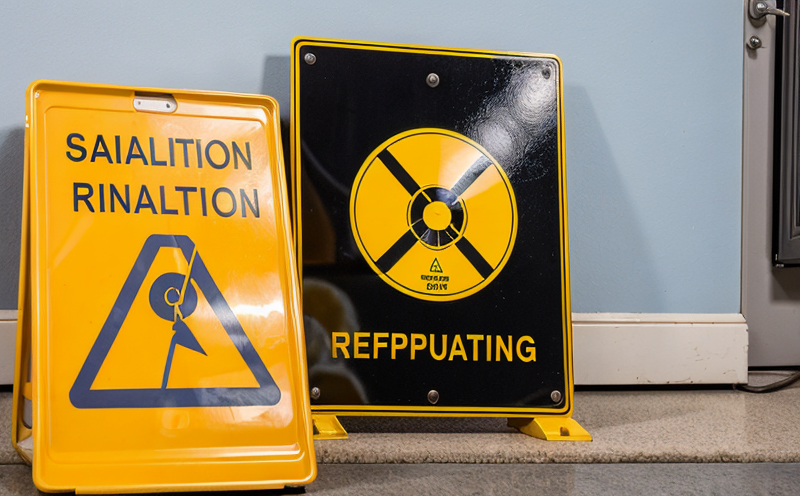ASTM D7283 Gross Alpha and Beta Testing for Drinking Water
The ASTM D7283 standard provides a comprehensive method to determine gross alpha and beta activity in drinking water. This testing is crucial for ensuring compliance with regulatory standards, protecting public health, and maintaining the quality of potable water supplies.
Radiation safety tests are essential in assessing the potential risks associated with radioactive contamination in water sources. This service ensures that water utilities can meet stringent international and national standards, thereby safeguarding consumers from exposure to harmful radionuclides.
ASTM D7283 is widely recognized for its accuracy and reliability. The method involves several key steps: sample collection, transport, preservation, and analysis using a gamma spectrometry system equipped with a low-background Ge detector. This approach ensures the detection of even trace levels of alpha and beta emitters.
For this testing, we use high-purity germanium (HPGe) detectors, which are capable of detecting very small amounts of radiation. The HPGe detectors are calibrated to ensure precision and accuracy in measuring gross alpha and beta activity. This method allows for the identification and quantification of radionuclides that may be present in drinking water.
The testing process begins with the collection of a representative sample from the water source. Careful attention is paid to the sampling procedure to avoid contamination or loss of radioactive material. The collected samples are then preserved using appropriate methods before undergoing analysis.
Analysis involves placing the sample in the gamma spectrometry system and allowing it to count for an adequate period, typically several hours, to ensure accurate measurements. The data obtained from this process is then analyzed according to ASTM D7283 guidelines to determine the gross alpha and beta activity levels.
The results of the testing are reported in terms of picocuries per liter (pCi/L) for both alpha and beta activities. These values provide valuable insights into the radiological quality of drinking water, enabling utilities to take corrective actions if necessary.
Our laboratory adheres strictly to ASTM D7283 protocols to ensure consistent and reliable results. By utilizing this standard method, we can provide accurate and repeatable testing that meets regulatory requirements and industry best practices.
Scope and Methodology
The scope of the ASTM D7283 gross alpha and beta testing for drinking water is to determine the presence and levels of radioactive contaminants in potable water supplies. This method ensures that water utilities can comply with regulatory standards and provide safe drinking water.
| Step | Description |
|---|---|
| Sample Collection | Collect a representative sample from the water source, ensuring proper preservation methods are used to prevent contamination or loss of radioactive material. |
| Transport and Storage | Transport the samples under controlled conditions to the laboratory for analysis. Store them in appropriate containers to maintain their integrity. |
| Preparation for Analysis | Prepare the samples by dissolving or diluting, as necessary, to ensure they are suitable for gamma spectrometry analysis. |
| Analytical Procedure | Use high-purity germanium (HPGe) detectors with a low-background Ge detector to measure gross alpha and beta activity levels. Calibrate the equipment regularly for accuracy. |
| Data Analysis | Analyze the data collected from the gamma spectrometry system according to ASTM D7283 guidelines to determine the gross alpha and beta activity levels in picocuries per liter (pCi/L). |
| Reporting Results | Report the results, including both alpha and beta activities, using units of pCi/L. Provide a detailed report that includes all relevant data and findings. |
| Acceptance Criteria | Description |
|---|---|
| Gross Alpha Activity | The maximum acceptable level of gross alpha activity in drinking water is 1 pCi/L. |
| Gross Beta Activity | The maximum acceptable level of gross beta activity in drinking water is 4 pCi/L. |
| Data Validation | Ensure that the data collected meets the acceptance criteria specified by ASTM D7283. Validate the results through replicate measurements if necessary. |
| Compliance Reporting | Provide a compliance report that includes all relevant data and findings, ensuring that water utilities are aware of their performance against regulatory standards. |
Eurolab Advantages
Our laboratory offers several advantages when it comes to ASTM D7283 gross alpha and beta testing for drinking water. With our state-of-the-art facilities, experienced staff, and commitment to quality, we ensure that every test is conducted with precision and care.
We employ highly trained professionals who are experts in radiation safety and compliance testing. Our team uses the latest equipment and techniques to provide reliable results. We also offer a range of additional services, such as training programs and consultation on best practices for water utilities.
Our facilities are equipped with advanced gamma spectrometry systems capable of detecting even trace levels of radioactive contaminants in drinking water. This allows us to provide accurate and repeatable testing that meets regulatory requirements and industry best practices.
We pride ourselves on our commitment to excellence, reliability, and customer satisfaction. Our clients can rest assured that they are working with a trusted partner who understands the importance of radiation safety and compliance testing.
International Acceptance and Recognition
The ASTM D7283 gross alpha and beta testing for drinking water is widely recognized and accepted internationally. This method ensures that water utilities can comply with regulatory standards and provide safe drinking water to consumers.
The standard has been adopted by numerous countries, including the United States, Canada, and several European nations. It provides a consistent approach to measuring gross alpha and beta activity in drinking water, ensuring that results are comparable across different regions.
Our laboratory is accredited according to ISO/IEC 17025:2017, which ensures that we meet the highest standards of quality and reliability. This accreditation is a testament to our commitment to delivering accurate and consistent testing results.
We also offer international recognition through our affiliation with various organizations and networks dedicated to radiation safety and compliance testing. Our clients can be confident in the accuracy and precision of our tests, regardless of their location or regulatory environment.





